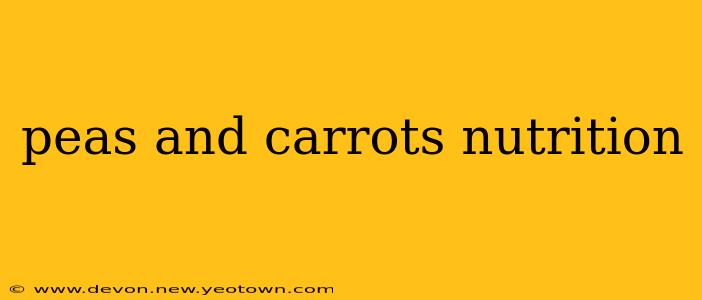Peas and carrots. The classic side dish, the vibrant addition to countless meals, the childhood staple. But beyond their familiar appeal lies a nutritional powerhouse. This isn't just about childhood memories; it's about a surprisingly potent combination of vitamins, minerals, and antioxidants that benefit your health in more ways than you might imagine. Let's delve into the world of peas and carrots, uncovering their individual nutritional profiles and the synergistic benefits of enjoying them together.
What are the Nutritional Benefits of Peas?
Imagine a tiny green sphere, packed with goodness. That's the pea. These little legumes are nutritional superstars, boasting a significant amount of Vitamin K, crucial for blood clotting and bone health. They're also a great source of Vitamin C, an antioxidant that strengthens the immune system and protects against cell damage. Beyond vitamins, peas are rich in fiber, aiding digestion and promoting gut health. They also offer a decent amount of protein, making them a valuable addition to vegetarian and vegan diets. Think of peas as tiny, green powerhouses contributing to overall well-being.
What are the Nutritional Benefits of Carrots?
Carrots, with their vibrant orange hue, are synonymous with good vision thanks to their high beta-carotene content. Our bodies convert beta-carotene into Vitamin A, essential for maintaining healthy eyes and supporting immune function. But the benefits don't stop there. Carrots are also packed with fiber, contributing to healthy digestion, and they provide a good source of potassium, vital for maintaining healthy blood pressure. The antioxidants in carrots help protect against cell damage, contributing to overall health and longevity. It's a simple vegetable with a surprisingly complex nutritional profile.
Are Peas and Carrots a Good Source of Fiber?
Absolutely! Both peas and carrots are excellent sources of dietary fiber. Fiber is crucial for a healthy digestive system, helping to regulate bowel movements and preventing constipation. It also contributes to feelings of fullness, which can be helpful for weight management. The combination of peas and carrots provides a significant boost of fiber to your daily intake, supporting optimal gut health.
What Vitamins and Minerals are in Peas and Carrots?
Peas are particularly rich in Vitamins K and C, while also providing folate, manganese, and iron. Carrots, on the other hand, shine with their high Vitamin A (from beta-carotene) content, along with potassium and fiber. Together, they offer a wide spectrum of essential vitamins and minerals, contributing to overall health and well-being. This diversity in nutrient profiles makes the combination even more beneficial.
How Many Calories are in Peas and Carrots?
The calorie count of peas and carrots is relatively low, making them a healthy and satisfying addition to any meal. A typical serving size (around one cup) of cooked peas and carrots provides roughly 50-70 calories, depending on preparation methods. This makes them a smart choice for those watching their caloric intake while still seeking nutrient-rich options.
What are the Health Benefits of Eating Peas and Carrots?
The combined health benefits of peas and carrots are substantial. From improved digestion (thanks to the fiber) to enhanced vision (courtesy of the beta-carotene in carrots) and a strengthened immune system (due to the Vitamins C and A), this simple pairing offers a holistic approach to better health. The antioxidants in both vegetables also protect against cell damage, reducing the risk of chronic diseases. It's a testament to the power of simple, nutritious foods.
Conclusion: A Simple Pairing, Profound Benefits
Peas and carrots: more than just a classic side dish. They're a delicious and nutritious combination that offers a wealth of health benefits. Their combined nutritional profile makes them a smart addition to any balanced diet, promoting optimal health and well-being. So next time you're planning a meal, remember the power of this simple yet effective pairing – a testament to the fact that sometimes, the best things in life are simple, and incredibly good for you.

